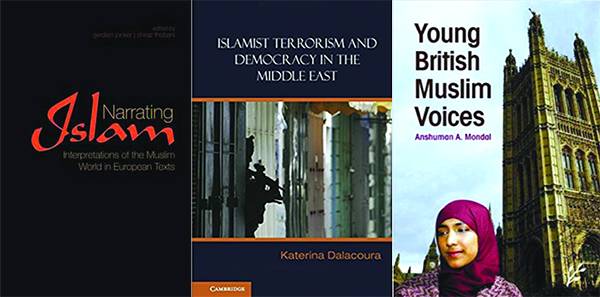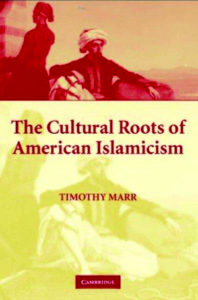

The Cultural Roots of American Islamicism
Timothy Marr
Cambridge University Press (2006)
Rs3,682
In this cultural history of American engagement with Islam in the colonial and antebellum period, Timothy Marr analyzes the historical roots of how the Muslim world figured in American prophecy, politics, reform, fiction, art and dress. Marr argues that perceptions of the Muslim world, long viewed not only as both an anti-Christian and despotic threat but also as an exotic other, held a larger place in domestic American concerns than previously thought. Historical, literary, and imagined encounters with Muslim history and practices provided a backdrop where different Americans oriented the direction of their national project, the morality of the social institutions, and the contours of their romantic imaginations. This history sits as an important background to help understand present conflicts between the Muslim world and the United States.
“The history of Americans perceptions of, and engagements with, the Islamic world is obviously of enormous interest today. One of the strengths of this book is that it pays attention to that of the diversity of those encounters, while not ignoring the fundamental relations of power between U.S. and Muslim populations. Marr’s well researched, erudite, and thoroughly engaging book provides not only a study of American Islamicism, but also a broad-based and intellectually rich analysis of the United States and its global cultural imaginings in the 18th and 19th centuries,” writes Melani McAlister of George Washington University.
“Marr’s study opens up a new historical context to American mis-images of Islam spread over the last three centuries and their unacknowledged reverberations even today,” writes Iftikhar Malik of Bath Spa University College in The Journal of American History.

Narrating Islam: Interpretations of the Muslim World in European Texts
Eds Gerdien Jonker & Shiraz Thobani
I.B.Tauris & Co Ltd. (2009)
Rs9,050
Mapping the diverse images of Islam and Muslims in educational texts as reproduced in national contexts across Europe and neighbouring regions, “Narrating Islam” explores both historical perceptions and contemporary representations of Islam and Muslims as projected through instructional media. Based on interdisciplinary research, it seeks to excavate the layered images of Muslims and Islam which have been historically embedded in semantic reservoirs and which feed into the modern scripting of the ‘other’ in a global context. “Narrating Islam” offers a framework to critically discuss European identity through interrogating how pedagogical discourses negotiate the Muslim presence in and around Europe.
Gerdien Jonker is affiliated with the Georg-Eckert Institute for International Textbook Research in Braunschweig, Germany Shiraz Thobani is a Research Associate at the Institute of Ismaili Studies, London.

Democracy In Islam
Sayed Khatab & Gary D. Bouma
Routledge (2007)
Rs12,814
Challenging the view of Islamic extremists and critics of Islam, this book explores the very topical issue of Islam’s compatibility with democracy. It examines: principles of Islam’s political theory and the notion of democracy therein; the notion of democracy in medieval and modern Muslim thought; Islam and human rights; the contribution of Islamic legal ideas to European legal philosophy and law.
The book addresses the pressing need for a systematic show of an Islamic politics of human rights and democracy grounded in the Holy Qur’an. The West wonders about Islam and human rights, and its own ability to incorporate Muslim minority communities. Many Muslims also seek to find within Islam support source for democratic governance and human rights.
Sayed Khatab is a Research Fellow in the School of Political and Social Inquiry at Monash University, Australia. His recent publications include The Political Thought of Sayyid Qutb: The Theory of Jahiliyyah (Routledge, 2006) and The Power of Sovereignty: The Political and Ideological Philosophy of Sayyid Qutb (Routledge, 2006).
Gary D. Bouma is UNESCO Chair in Interreligious and Intercultural Relations - Asia Pacific at Monash University, Australia. His research examines the management of religious diversity in plural multiculturalism societies, postmodernity as a context for doing theology, and religion and public policy.

Young British Muslim Voices
Anshuman A. Mondal
Greenwood (2008)
Rs6,855
In contemporary Britain, young British Muslims are often spoken about but very rarely invited to speak. What do they think about the social, cultural and political concerns that surround them today and how are they responding to them? This book attempts to find out by asking them to explore their experiences, attitudes and opinions, presenting a picture of ordinary young Muslim lives.
The young Muslim voices that are heard in this book come from many walks of life, reflecting the diversity of Muslim communities in Britain. They come from different parts of Britain, from a range of ethnicities, have different class backgrounds and situate themselves within different Islamic traditions. They share the common experience of growing up in Britain at a time when British Muslims have been thrust into the spotlight of public scrutiny.
What appeal does Islam have for them? What does being a Muslim mean to them? What do they think of life in Britain? Do they feel British? How do they feel about non-Muslims? What are their political views? What sort of relationship do they have with their families?
The young Muslims in this book speak to the author about these and other issues candidly and with insight. They articulate the hopes and frustrations of a generation at the crossroads of an important historical moment.
Anshuman A. Mondal is a Senior Lecturer in English at Brunel University (UK), and author of Nationalism and Post-Colonial Identity: Culture and Ideology in India and Egypt (2003) and Amitav Ghosh (2008).

Islamist Terrorism and Democracy in the Middle East
Katerina Dalacoura
Cambridge Uni Press (2011)
Rs3,201
What were the reasons behind the terrorist attacks of September 11th and the many others perpetrated by radical Islamist groups? Does the cause of Islamist terrorism relate to the lack of democracy in the Middle East? The assumption that there is a causal link between the two phenomena was widely accepted in the post-2001 period and appeared to inform Western foreign policies in the region, but does the premise really stand up to scrutiny? Through detailed research into the activities of both radical and moderate organizations across the Middle East, such as the Muslim Brotherhood, Hamas, Hizbollah, and the GIA, and via interviews with key personnel, Katerina Dalacoura investigates whether repression and political exclusion pushed Islamist entities to adopt terrorist tactics. She explores whether inclusion in the political process has had the opposite effect of encouraging Islamist groups toward moderation and ideological pragmatism. In a challenge to the conventional wisdom, she concludes that Islamist terrorism is not a direct consequence of authoritarianism in the Middle East, and that there are many other political and social factors that generate radicalism or inspire moderation.
“Dalacoura’s informed discussion of the trajectories of groups like the Armed Islamic Group and Gama’a Islamiyya that led bloody insurrections in Algeria and Egypt, and those like Egypt’s Muslim Brotherhood and Turkey’s Justice and Development Party that contest power non-violently, makes the case for counter-terrorism policies that appreciate the dynamic range of Islamist movements and promote democracy without claiming that political pluralism is the decisive antidote to armed violence that targets civilians,” writes Joe Stork, Deputy Director, Middle East and North Africa division, Human Rights Watch.
“In this challenging book, Katerina Dalacoura situates her analysis of Islamist terrorism within the theoretical discussion of terrorism in general, in opposition to the thesis of ‘Middle Eastern exceptionalism’...Well researched and admirably argued, her book is a considerable achievement and a most important contribution to the debate; it will be read with profit by all specialists on the region as well as those working in terrorism studies,” writes Hugh Roberts, Director, North Africa Project, International Crisis Group.
Katerina Dalacoura is Lecturer in International Relations at the London School of Economics and Political Science. She is author of Islam, Liberalism and Human Rights, Third Edition (2003) and Engagement or Coercion: Weighing Western Human Rights Policies Towards Turkey, Iran and Egypt (2004).

